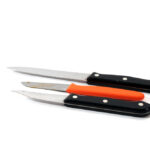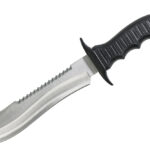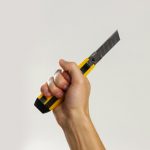The Offence of Having Custody of a Knife in a Public Place or School

The New South Wales Government is currently reviewing a legal exception which allowed a New South Wales teenager to be carrying a knife, which he allegedly used to stab a fellow student at a Sydney High School.
Under section 11C of the Summary Offences Act 1988 (NSW), it is an offence to carry a knife in a public place, or a school and carries a maximum penalty of 2 years in prison and/or a fine of up to $2,200.
However, under the law, there are reasonable excuses to be in custody of a knife. One of these is genuine religious purposes.
Stabbing
The exception has come under the spotlight in the past few days after a 14 year old allegedly stabbed a 16 year old student in the playground of Glenwood High School.
The younger teenager is facing two counts of wounding or causing grievous bodily harm with intent, which is an offence under section 33 of the Crimes Act 1900 carrying a maximum penalty of 25 years in prison.
He is currently at liberty on bail and due to reappear in court in July.
Police allege he stabbed the older boy in the stomach and back with a “religious knife”, possibly after being subjected to bullying.
Religious implement
Sikh students are permitted to take Kirpans to school because they are considered an important part of their religious faith.
What is a kirpan?
A kirpan is a small replica sword worn around the waist under the clothes. It is an article of faith that devout Sikhs must always wear. It is regarded as a ceremonial item, not a weapon of aggression, and symbolises readiness to fight oppression.
It is considered highly sacred, and some Sikhs don’t even remove the kirpan when they sleep.
Religion versus safety
But in the wake of the alleged stabbing, New South Wales Education Minister Sarah Mitchell decreed a blanket ban on students carrying any knives in all schools across the state.
The move was met with fierce criticism from some members of the Sikh community, and the Minister backtracked as a result. She now says the ban is only temporary until appropriate measures can be put in place which acknowledge the Sikh religious custom, as well as ‘put the safety of teachers and students first’.
The Sikh community has been divided over the ban, with some seeing it as discriminatory and ‘heavy handed’.
Others, including the Secretary of the Sikh Council of Australia, Bawa Singh Jagdev, said the ban is long overdue and that children should not be carrying the kirpan because they do not have the ‘maturity’ to handle it with care.
A solution yet to be found
Sarah Mitchell has since met with Community leaders to facilitate discussions to resolve the issue. Potential solutions include allowing the kirpans at school, so long as they are not removed from the protective sheath, or that students carry mock daggers.
The offence of custody of knife in public place or school
Having custody of a knife in a public place or school is an offence under section 11C of the Summary Offences Act 1988 which carries a maximum penalty of 2 years in prison and/or a fine of 20 penalty units, which is currently a total of $2,200.00.
To establish the offence, the prosecution must prove beyond reasonable doubt that:
- You possessed a knife, and
- You were in a public place or school.
A knife includes:
- A knife blade,
- A razor blade, and
- Any other blade
A public place is a place or part of a premises that is open to, or used by the public, whether or not for payment, and whether or not only open only to a limited class of persons.
It includes privately owned places that are open to the public, such as:
- Shopping centres and stores within them,
- Restaurants, pubs and clubs, and
- Sporting venues.
A defence to the charge is that you had a ‘reasonable excuse’ for possessing the knife which includes, but is not limited to, the knife being ‘reasonably necessary’ for:
- The lawful pursuit of your occupation, education or training,
- The preparation or consumption of food or drink,
- Participation in lawful entertainment, recreation or sport,
- Exhibition for retail, trade or collector purposes,
- Wearing an official uniform, or
- Genuine religious purposes.
The onus is on you to prove the reasonable excuse ‘on the balance of probabilities’, which means more likely than not.
A reasonable excuse does not include having the knife solely for self-defence or the defence of another person.
Updated offence under the Crimes Act
In 2024, the above offence was moved over to become an indictable offence under the Crimes Act 1900.
Under section 93IB of the Act it is an offence to be in custody of a knife in a public place or a school. This offence carries a maximum penalty of a fine of $4,400, imprisonment for 4 years, or both.
A further offence is outlined under section 93IC of the Act which applies if a person uses or carries a knife that is visible, if the use or carrying occurs:
- In the presence of a person; and
- In a public place or a school; and
-
In a way that is likely to cause a reasonable person to reasonably fear for the person’s safety.
This offence carries a maximum penalty up to $11,000, imprisonment for 4 years, or both.
A ‘knife’ is includes a knife blade and a razor blade.
A ‘public place’ includes any place or part of premises that is open to the public, or is used by the public whether or not on payment of money or other consideration, whether or not the place or part is ordinarily so open or used and whether or not the public to whom it is open consists only of a limited class of persons.
A statutory defence (which is an offence relating specifically to the offence) exists for both offences if the accused person establishes ‘on the balance of probabilities’ (in other words, more likely than not) that he or she had a reasonable excuse for carrying the knife.
Under the Act, a reasonable excuse is where it was necessary to carry or use the knife for:
- The lawful pursuit of the person’s occupation, education or training, or
- The preparation or consumption of food or drink, or
- Participation in a lawful entertainment, recreation or sport, or
- The exhibition of knives for retail or other trade purposes, or
- An organised exhibition by knife collectors, or
- The wearing of an official uniform, or
- Genuine religious purposes, or
- During travel to or from or incidental to any of these activities.
Carrying a knife for the purposes of self-defence or defence of another is not a reasonable excuse.
Going to court for having custody of a knife?
If you have been charged with possessing a knife, call Sydney Criminal Lawyers anytime on (02) 9261 8881 to arrange a free conference with an experienced defence lawyer who will advise you of your options and the best way forward.








